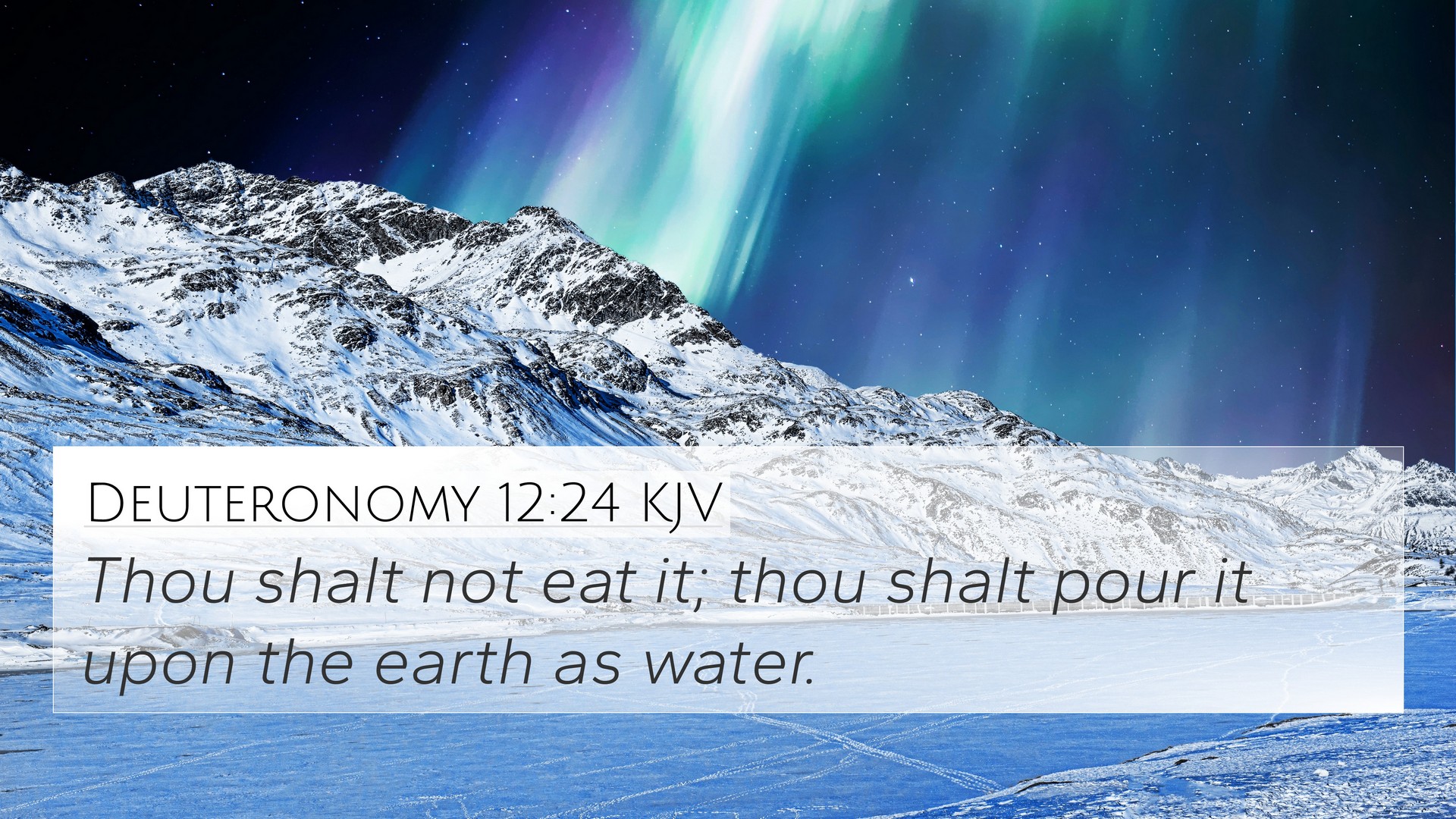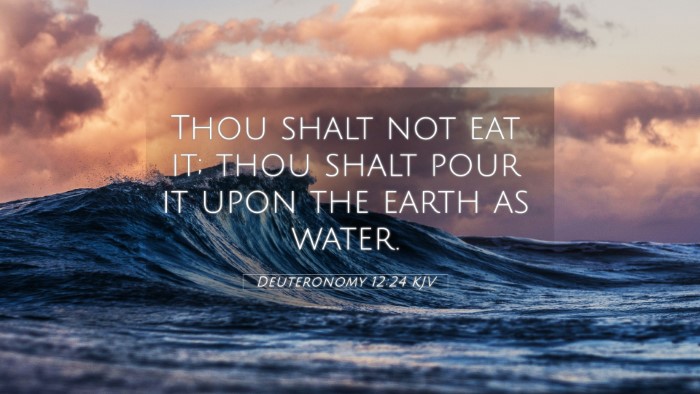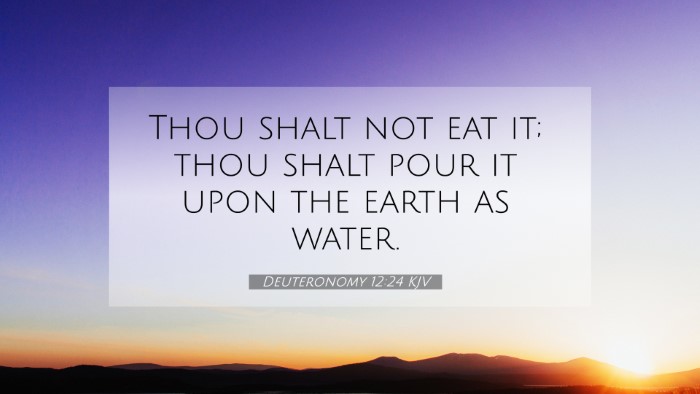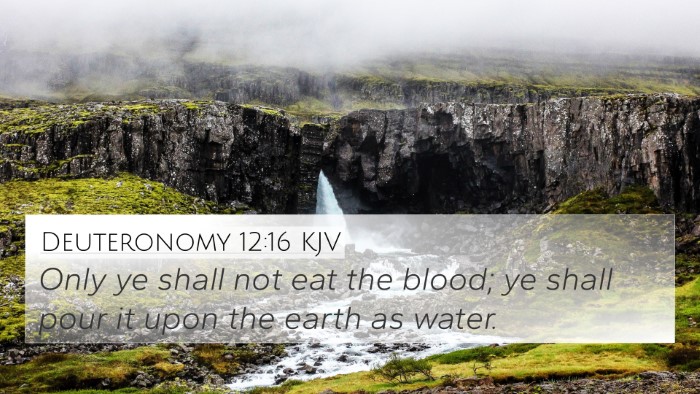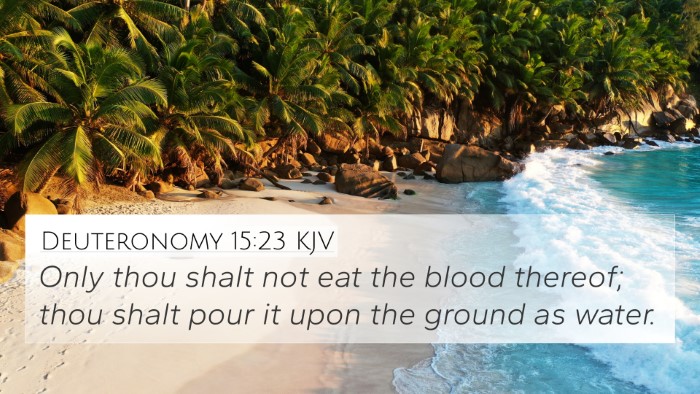Understanding Deuteronomy 12:24
Deuteronomy 12:24 states: "You shall not eat it; you shall pour it out on the earth like water." This verse highlights an important instruction regarding the sacrificial practices and the treatment of blood during offerings to God.
Commentary Insights
Insights from various public domain commentaries illustrate the theological significance of this verse and its implications for worship and sacrificial practices.
Matthew Henry's Commentary
Matthew Henry emphasizes the sanctity of blood in the sacrificial system. He notes that blood represents life, and thus, it is to be treated with reverence. The act of pouring out blood on the ground symbolizes its return to God, as life ultimately belongs to Him. Henry underscores the seriousness of atoning for sins, highlighting that one cannot approach God lightly.
Albert Barnes' Notes
Albert Barnes further elaborates that the prohibition of consuming blood is reiterated throughout the Scriptures, emphasizing its significance in the covenant community. He aligns this command with principles found in Leviticus 17:10-14, where blood is designated for expiation and is not to be desecrated by human consumption. Barnes articulates that such commands were protective measures for the Israelites, ensuring that their worship practices remained pure and focused on God’s holiness.
Adam Clarke's Commentary
Adam Clarke elaborates that the regulation regarding blood serves not only to maintain the sanctity of worship but also to promote health and societal well-being among the Israelites. Clarke explains the importance of obedience to God’s commandments and how they guide communal living, ensuring that practices are in harmony with divine expectations. He references the historical context where bloodletting was common in other cultures, thus indicating the distinctiveness of Israel's liturgical practices.
Thematic Connections and Cross-References
This verse connects with several significant themes within the Bible, particularly concerning sacrificial laws and their meaning within the Old Testament. Below are some key cross-references:
- Leviticus 17:10-14: Discusses the prohibition of eating blood and the importance of its sanctity.
- Genesis 9:4: God’s command against consuming blood, establishing a principle for humanity.
- Hebrews 9:22: Highlights the necessity of blood for the remission of sins, connecting Old Testament practices with New Testament fulfillment in Christ.
- Exodus 29:12: Details the sacrificial procedures and the treatment of the blood of offerings.
- 1 Peter 1:19: The precious blood of Christ signifies the ultimate sacrifice, drawing parallels to the Old Testament sacrificial system.
- Isaiah 53:5: Prophetic insights into the suffering servant, illustrating the redemptive value of His blood.
- Romans 3:25: Explains Christ as a sacrifice of atonement through His blood, reaffirming the continuity of blood as a means of reconciliation with God.
Exploring Biblical Cross-Referencing
Understanding Deuteronomy 12:24 involves not only an analysis of its immediate context but also an exploration of how it interrelates with other scriptures. This practice is crucial for anyone engaged in Bible study or seeking to deepen their understanding of the text through connections. Here are some tools and methods for effective Bible cross-referencing:
Tools for Bible Cross-Referencing
- Bible Concordance: This tool allows readers to locate verses related to specific keywords, which can facilitate thematic studies.
- Bible Cross-Reference Guide: A resource that outlines significant links between passages, helping to illuminate the unity of scripture.
- Cross-Reference Bible Study: Techniques that focus on finding relationships between verses to enhance understanding.
- Bible Reference Resources: These may include commentaries, study Bibles, and reference books that provide in-depth analysis and connections.
Best Practices for Cross-Referencing Bible Verses
When engaging in Bible cross-referencing, consider the following methods:
- Identifying Themes: Look for recurring themes such as sacrifice, redemption, and covenant that appear throughout the Bible.
- Comparative Studies: Examine passages from the Old Testament alongside their New Testament counterparts for a comprehensive understanding.
- Inter-Biblical Dialogue: Study the relationship between various writings, such as the Prophets and the Apostolic teachings.
- Utilizing Cross-Reference Systems: Employ a systematic approach to tracing themes and concepts throughout the scriptures.
Conclusion
In conclusion, Deuteronomy 12:24 serves as a fundamental verse concerning proper worship and the significance of blood within the sacrificial system. By examining the insights provided by respected commentaries and identifying cross-referenced verses, one gains a clearer picture of the theological implications of this verse. Engaging with the Bible in this way not only enhances personal study but also enriches one’s understanding of Scripture as a unified narrative of redemption.
As you explore the connections between Bible verses, reflect on how the themes are woven throughout scripture, providing depth and meaning to your faith journey.
